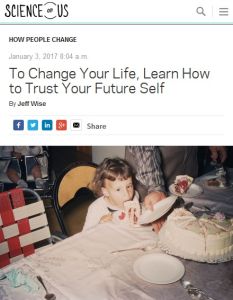
Jeff Wise
To Change Your Life, Learn How to Trust Your Future Self
New York, 2017
What's inside?
Cartoons show self-control as an angel and devil perched on opposite shoulders. Science reveals it’s a bit more complicated than that.
Recommendation
Waking up earlier, saving for a down payment on a house, learning a foreign language – no matter the goal you have in mind, your brain will do its best to sabotage it. Things may go smoothly for a week or two, but before you know it, you’re pressing snooze, spending your hard-earned cash on takeout and watching Netflix again. But does it have to be this way? New York magazine writer Jeff Wise reveals research into self-control that may change your life. Dive into psychological studies and concrete suggestions to achieve your dreams. getAbstract advises anyone who feels stuck to let Wise’s wisdom move you forward.
Take-Aways
- In the 1960s, researcher George Ainslie studied how pigeons make decisions. He learned that the birds were better at making good choices between two options if the payouts were both in the distant future.
- People can “foresee future payoffs.” Each time you do something toward a goal, you get a feeling of satisfaction.
- Positive feelings accumulate over time in a process Ainslie calls “bundling.”
- To reap the biggest rewards from bundling, you must trust your “future self” to continue with the desired behavior.
- To build trust with future you, follow two steps. First, make yourself a “simple rule” to follow, one you can’t mess up. Second, “follow step one.”
Summary
Everyone knows this feeling: You want to slim down, but that ice cream just looks too good; you need to save money, but you blow it on a fancy vacation; you want to get in shape, but you sit around on the couch all day. People aren’t so great at making good choices, despite good intentions. But why is this? Scientists don’t know for sure, but they have some ideas.
“Intriguingly, researchers have found that people who more strongly identify with their future selves are better at self-control.”
One classic study comes from researcher George Ainslie. In the 1960s, Ainslie studied how pigeons “chose between options that were near or far in time.” In his experiment, he offered birds a choice: They could have a small amount of grain after a wait of one second or a larger amount of grain after a wait of four seconds. The birds chose the small amount. This is known as “delay discounting,” and it didn’t come as a surprise. The results of the next part of the experiment, however, were unexpected. Again, Ainslie offered the pigeons two buttons: one would dispense a large amount of grain in 14 seconds, the other a small serving in 10 seconds. This time, the birds opted to wait longer for more. Why the change of heart? In pigeon minds, 10 seconds and 14 seconds are both a long time away. So they opted for the larger amount. Humans, it seems, do the same thing.
“We tend to think of desire as something immutable, a thing that you either possess or you don’t. But if we don’t really think that something is available to us, we don’t want it.”
Say you want to write a novel, so you decide to wake up early every morning to write for a few hours before going to work. When your alarm starts blaring at 5 a.m., you quickly slam down the snooze button and retreat under the covers for another hour of sleep. But according to Ainslie, there is something humans can do – that pigeons can’t – to combat this lack of commitment: People can “foresee future payoffs.” Each time you do something toward your goal, you get a feeling of satisfaction. These positive feelings accumulate over time in a process Ainslie calls “bundling.” By bundling, you’re effectively “mentally projecting yourself into the future so you can experience the satisfaction of tomorrow’s rewards today.”
To reap the biggest rewards from bundling, you need a second ingredient: trust. You must trust your “future self” to continue with the desired behavior. If you think that there’s no reason to bother eating healthy today because tomorrow you’ll certainly give up, you’ll never succeed. To build trust with future you, follow two steps: 1) Make yourself a “simple rule” to follow, one you can’t mess up; and 2) “follow step one.”
About the Author
Jeff Wise is a magazine writer based in New York and author of Extreme Fear: The Science of Your Mind in Danger.
This document is restricted to personal use only.
My Highlights
Did you like this summary?
Read the articleThis summary has been shared with you by getAbstract.
We find, rate and summarize relevant knowledge to help people make better decisions in business and in their private lives.
Already a customer? Log in here.
















Comment on this summary